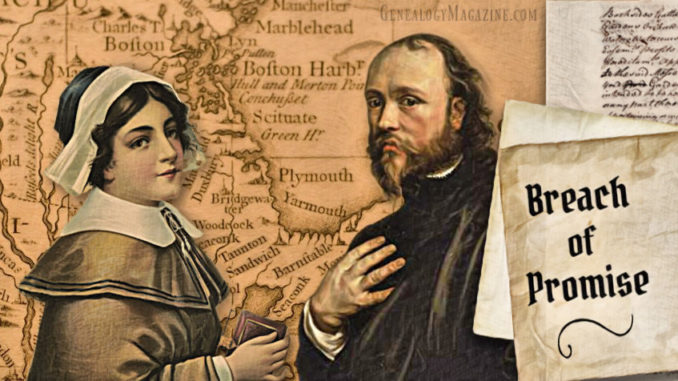
“Scarcity breeds demand and women were scare in early America,” wrote Myra Vanderpool Gormley in Colonial Love and Marriage. “In a rich new world, marriageable white women remained rare — and eagerly sought.” What if you find an ancestress had more than one fiancé?
In New England’s Plymouth Colony in 1661, John Sutton filed a lawsuit against Mary Russell for breach of promise. Mary, said John, by accepting a marriage proposal from another man after she was already engaged to Sutton. The injured party asked the court for £200—a princely sum equating to $42,000 in today’s economy. The court ruled in favor of Sutton, considerably discounting his damages to £15.
By 1662/3, Mary Russell had married another John whose last name was Jacob. The other John disliked that monetary loss.1 We don’t know what Mary’s husband did for a living, but in mid-seventeenth century Massachusetts, wages ranged from thirteen pence to two shillings per day, depending on the vocation;2 women earned four to five pounds per year.3
The Jacobs, who lived in Hingham, sought a review of the case. In March 1662/3, the court—determined that if the original jury had taken notice of the testimonies as heard by the justices—they would’ve found that “Mary might have just ground to retract from any such conditionall promise or engagement,” as appeared to have been made by her; that what wrong against John Sutton was made by her father then by Mary, “shee haueing [having] heard such thinges concerning the said Sutton as might justly discurrage her, although the truth of such reports wee see not cause to determine.” The court, considering the “charge and trouble” that John Jacob spent in clearing his wife’s innocence, reversed the decision and ordered Sutton to pay Jacob 50 shillings.4
NOTES AND REFERENCES
- Nathaniel B. Shurtleff, M.D., Records of the Colony of New Plymouth in New England (Boston: William White, 1857), p. 108.
- Gloria L. Main, “Gender, Work, and Wages in Colonial New England,” The William and Mary Quarterly, Vol. 50 (January 1994), no. 1, pp. 51-60.
- The New Volumes of the Encyclopedia Britannica, Vol. IX (New York: The Encyclopedia Britannica Company, 1902), p. 721.
- Shurtleff, Records of the Colony of New Plymouth in New England, p. 108.
